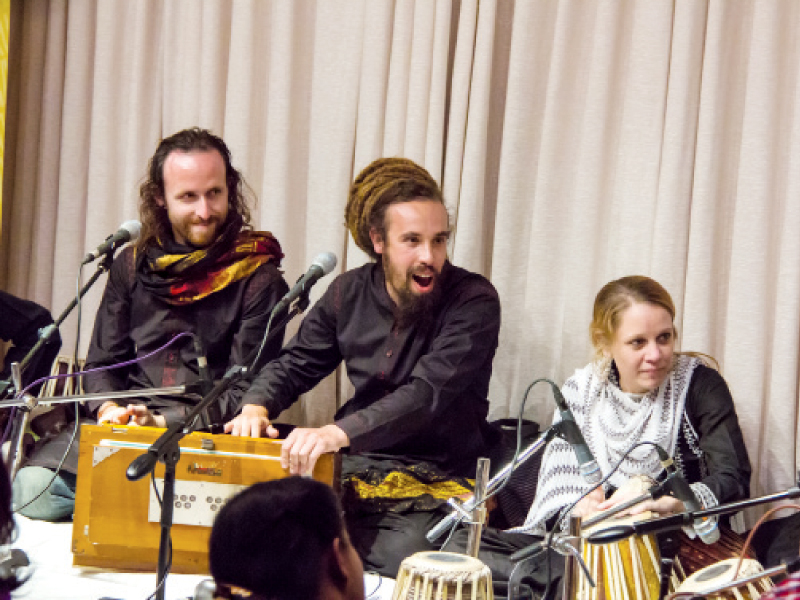
ISLAMABAD:
As the nation’s capital, Islamabad is home to numerous foreigners who are seen donning local dresses in a bid to assimilate with the natives. However, Aminah Chishti, a US national, not only changed her appearance to fit in, but has managed to assimilate into the man’s world that is classical music by becoming the first female tabla player in the history of classical music to perform at Sufi shrines around Pakistan.
Chishti is part of the band “Fana-Fi-Allah” --- a group of nine devoted foreigners who have dedicated their lives to spread the message of Sufis in the West since 2001. They have performed at hundreds of festivals and concerts worldwide where they share their passion for qawwalis.
Chishti has performed at a number of Sufi shrines and festivals since 2001, the most famous ones being the tombs of Data Ganj Baksh in Lahore, Baba Ganj-i-Shakar in Pak Pattan, Baba Bulleh Shah in Kasur and Baba Lasuri Shah in Faisalabad. In India, she has performed at the tombs of Khwaja Nizamuddin Aulia, Hazrat Amir Khusrau, Pir Inayat Khan and Khwaja Moinuddin Chishti.

With her devotion, she has changed boundaries for women across Pakistan by performing at various shrines where women rarely take on a prominent role.
Chishti’s journey towards Sufism and devoting her life to classical music began when she was given a Nusrat Fateh Ali Khan music cassette eleven years ago. “It was then that classical music just immediately touched my soul and my quest began,” she said. While travelling back and forth between America, India and Pakistan, her journey led her to the legendary Dildar Hussain Khan, a tabla master who worked and toured with Khan during his heyday. He practices a unique style of tabla playing known to be over 1,000 years old and drafted by the legendary poet Amir Khusro. The style is a combination of ‘jori’ which is used as the treble and ‘dhamma’ which creates a deeper sound. “I came to Dildar with the hope and will to learn” she said “Today I not only perform to spread the message of Sufis in the West but I also teach the rare music form” she added.
Apart from playing classical music she also sings to the tune. Her master, Dildar, while praising her dedication, said she came to him years ago wanting to learn. “People around me raised eyebrows…[why does] a girl from America want to learn the tabla?” he said.

Dildar said Chishti has taken the first and most difficult step of defying the norm and has thus opened the floodgate for many women who want to learn the tabla. “There are many women in our country who admire the sound of the tabla but are restricted to performing in small gatherings or weddings.
The lead vocalist of Chishti’s group, Tahir Qawwal, studies from vocal masters Rahat Fateh Ali Khan, Pashupati Nath Mishra, Sher Ali Khan and Muazzum Qawwal. Tahir plays the harmonium and sings the qawwalis. “I was pulled out of my cultural and religious roots at an early stage. I have lived like a beggar in the Himalayas and it has been a journey full of spirituality”.
At a qawali workshop organised by the Institute for Preservation of Arts and Culture in collaboration with the US Embassy at Kuch Khass on Tuesday evening, a number of music lovers gathered to listen to and learn about classical music. The band got an opportunity to play with the Bakshi brothers and Ustad Dildar Hussain’s group. The workshop started with the expert artists explaining the qawaali form of singing, its various styles and techniques. While explaining each stage systematically, Tahir managed to elaborate the style of singing with personal experiences and historical significance. All three groups got a chance to perform individually and ended the performance with a remarkable fusion of all three groups.
Fana-Fi-Allah will be touring all of Pakistan this month, hitting Islamabad, Lahore, Karachi, Multan, Pak Pattan and Faisalabad.
Published in The Express Tribune, December 5th, 2013.
COMMENTS (10)
Comments are moderated and generally will be posted if they are on-topic and not abusive.
For more information, please see our Comments FAQ














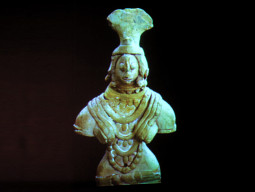
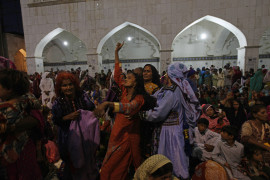
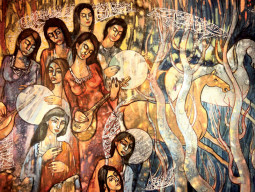
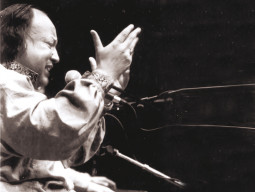

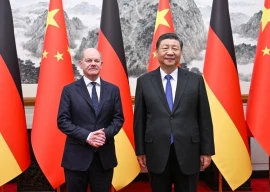
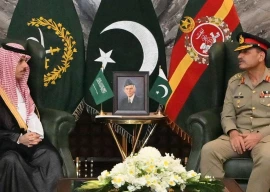

1701091268-0/Elon-Musk-(3)1701091268-0-270x192.webp)






















Dear all above it is to inform you that she is basically the first Qawali Tabla player because there is a difference between a classical Tabla and Qawali Tabla.
@saad sarfraz: You missed the point . He was talking about Muslim women , not non-muslims.
I wish ET's reporters researched before writing. India has a lot of female tabla payers, and 2 years ago, someone uploaded this on youtube...
Haniya - First Tabla Player of Pakistan: http://www.youtube.com/watch?v=nTJx6XJVfZY
So Sufism is about singing Qawwali? What ignorance!
Nice to see her, its great. Woman can do everything,its a spirit to do anything which she needs, and promotion of spirit comes if someone has encouragement,appreciation from with in ( family).
Good for her, but she's not the first woman to play tabla. About a decade ago when we were in India to visit relatives, one day my uncle took us to his friend's home who was a classical musician. There I saw his daughter playing tabla with remarkable expertise.
Are you sure there was a social barrier for women to play tabla? Look it up there are/were many. Anuradha Pal, Heena Patel, Sunayana Ghosh and Rimpa Swapan to name a few.
Most importantly, this instrument is an accompanying instrument, which means when the men play the tabla and women like Abida Parveen sing, the limelight is on the woman singing not on the men playing tabla.
Sufism is a great peaceful way of life and table with harmonium is just agreat eastern combination. My niece has learned the table and plays in Gurudwaras. Then again I see few other women also playing.
It is our tradition and we should do better at it than others. I hope Pakistan does not fully disown Sufism. ..A Wanna be Sufi
We come from the land of Sufism yet we don't apply those principles. Foreigners do but we don't.